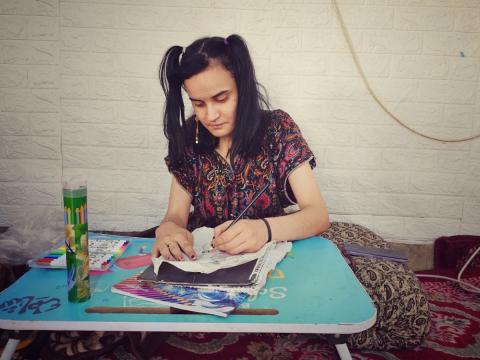No Water, No Toilet, No School: One Girl’s Daily Reality

Huda is 20 years old and lives in a remote village in Rashad, 46. 2 Kilometers away from Kirkuk, with her large family of 16 members. Her life is one of isolation and daily hardship. Due to amputation in one of her legs, Huda is unable to walk and relies on a four-stick stand to move around. She spends all her time confined to her home, only stepping outside to use the toilet. “I don’t go out at all. I am all the time using the mobile to connect to the outer world,” Huda shared.
Her family turned a storage space into a makeshift toilet for her, but it is located outside the home, and she must travel a distance to reach it. The toilet is in poor condition - small, dirty, and leaking when it rains. There are no proper toilet or washing facilities, making each visit a painful and uncomfortable experience for her. “The place of the toilet is small, dirty, and not proper. It is not comfortable and I am bothered. I wish if the water is clean and the toilet is properly built and clean. It is far where I go, and I wish if we have western and eastern toilets,” Huda said.
Huda suffers from a serious illness that led to one of her legs being amputated above the knee. Every week, she requires an injection as part of her lifelong treatment. Each injection costs 135,000 IQD (103.03 USD), a heavy burden for a family struggling with poverty.
Her father, who is also unwell and unable to do heavy labour, works as a guard earning just 250,000 IQD (190.8 USD) per month. “It is not enough for a family of 16 members. We are in a very poor situation,” he said. Their home is in a remote area, shared with only one neighbour. Access to services is extremely limited.
Water is another major concern. The family does not have access to clean water. “Our water is not clean and is contaminated,” Huda said. Her father explained, “The water is not filtered. We use pottery to clean the water. When I have money, I buy clean water. When I don’t, we use the contaminated water that reaches us.” Huda shared, “Sometimes I cannot go to the toilet or take a shower because the water finishes quickly.”
Huda’s immune system is weak, and even minor changes in the weather can cause her to fall ill. Her psychological wellbeing is also affected. She has never attended school, unlike three of her younger siblings who are able to go thanks to help from relatives and friends. “We are a lot, and my father didn’t send them to school because we don’t have the means,” Huda said. Her father added, “I feel so much pain and regret that they don’t go to school. They have grown up and cannot study.”
When Huda lost her leg, it had a deep emotional impact on the entire family. Her father said, “When she asks me for something special and I cannot provide, I become very sad. I can only provide basic needs. I wish you can provide help to us, and to Huda and the children.”
Despite her situation, Huda finds moments of escape through drawing. She has a natural interest in art and often copies drawings she sees on YouTube using the mobile phone. “I like to draw.” she said. She gets into a world of imagination while staying at home by drawing. “I draw when I feel like it. But I am often in pain because of my illness, and I need proper time to draw.”
Huda dreams of one day having her own small shop to run and sell items. But for now, her needs are far more urgent and basic. “We need help - washing facilities, water. My father is sick and cannot afford to provide. My wish for the future is clothes, shampoos, money, and cleaning products. I don’t have dreams for the future. I only like to draw.”
The family’s needs are immediate: access to clean water, safe and accessible sanitation facilities, basic hygiene supplies, and support for Huda’s ongoing medical treatment. Without external support, their already fragile circumstances may deteriorate even further.
Before the conflict of 2014, the Rashad subdistrict, including all its villages, had a population of around 25,000. Today, only about 6,000 individuals have returned. Abdulqahar Abdulla, World Vision Iraq Project Manager in Kirkuk, said, “The Rashad sub-district in Daquq District, Kirkuk Governorate, has been severely impacted by past conflict and displacement. Of the original population of 25,000, only around 6,000 people have returned. The area faces acute water scarcity, damaged infrastructure, and inadequate sanitation services. Climate change has further exacerbated drought conditions, leaving families without reliable access to safe drinking water or proper sanitation facilities. These conditions pose serious health risks, particularly for women, children, and persons with disabilities. We seek to address the urgent water, sanitation, and hygiene needs in the area, with the aim of improving public health, restoring dignity, and strengthening community resilience in the face of future climate-related shocks.”
Meanwhile, Khalil Hamid, Operations Manager for World Vision Iraq, noted about this urgent need in Rashad subdistrict, “Rashad is one of the areas with the most critical water, sanitation, and hygiene needs I have encountered in Iraq. The community lacks access to clean water, with residents relying on raw water from irrigation canals. Open defecation is widespread, and four to five households often share a single unimproved latrine. None of the schools or healthcare facilities have basic access to clean water, sanitation, or hygiene services. Moreover, none of the schools are equipped with child-, disability-, or gender-friendly water, sanitation, and hygiene facilities. Despite the severity of needs, Rashad remains significantly underserved, with a minimal presence of humanitarian and development actors.”